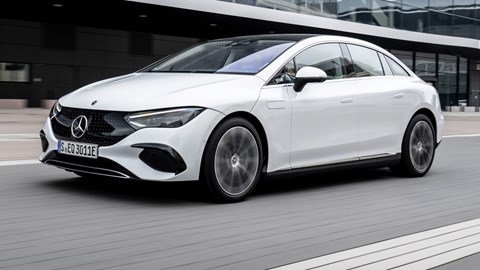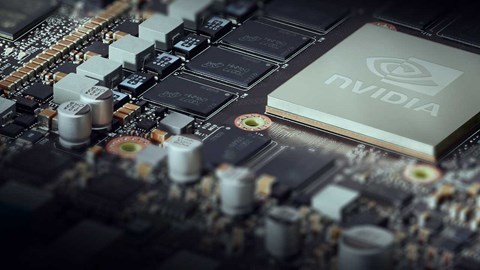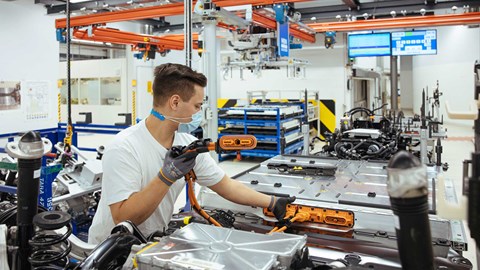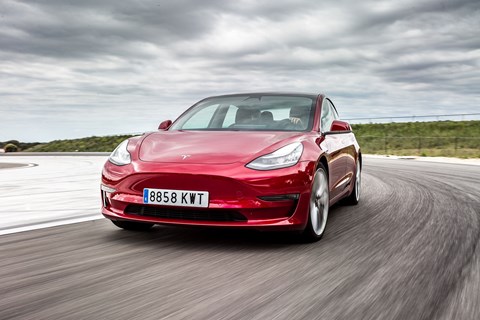► VW warns supply problems to continue ’til 2024
► Global chip shortage has throttled production
► Everything you need to know
In the past two years, the car industry has had to weather the uncertainty of Brexit, a global pandemic and war in Ukraine – but there’s one further crisis that’s been causing deep, deep problems throughout 2021-22: the global microchip shortage. What started as an inconvenience for those looking to buy a PlayStation 5, Xbox or TV has now made its way to the car industry.
Talking at the FT Future of the Car conference, Mercedes CEO Ola Källenius revealed just how the global chip shortage is affecting the three-pointed star: ‘What’s going on now is that we are still suffering from what I would call a Covid whiplash effect, where some of the supply chains are strained. The main one that’s holding us back is semiconductors. It’s not just Covid, it’s also a structural problem hiding behind what we experienced in 2021 and the end of 2020,’ he added.
‘And if you add war in Europe, new shutdowns in China, there is a significant strain on global supply chains. So we can’t meet demand at the moment, and it feels like an eternity where that has been the case, but eventually that will ease, and we believe that next year especially on the semiconductor side all those investments that we’ve made here in the last couple of years come to fruition, that we will see a better situation.’

Who is affected?
The lack of chips means car makers such as Jaguar Land Rover, the Renault-Nissan-Mitsubishi Alliance, Stellantis and the Volkswagen Group have all been affected by supply issues leading to temporary shutdowns at many plants. Our latest round-up shows that the crisis shows no sign of subsiding, with some companies affected far more than others.
In the UK, sales of new cars are slowing down as supplies of new cars dwindle and waiting list grow. It’s no coincidence that used car sales are booming at the moment…
What is the semiconductor shortage and why is it happening?
The chip shortage is a triple-pronged problem, though the cause of two prongs can be traced back to coronavirus. Just like the car industry, the semiconductor industry was forced to partially shut down because of the pandemic, resulting in a smaller supply of chips than usual.

And at the same time, the need for tech for home working, as well as the launch of two new gaming consoles – the PlayStation 5 and Xbox Series S/X – meant demand for those chips was higher than ever. And yes, those consoles will have made a splash – Sony estimates it sold 4.5 million units last year alone.
Finally, a fire at the Renesas Electronics factory – one of the largest semi-conductor makers for the automotive industry – plus a trade war, and severe weather in Texas haven’t helped matters, either.
Just how bad is it?
Cars are all now so technologically advanced that the crisis is affecting almost every manufacturer. Global industry consulting firm AlixPartners predicted that the shortage would cost car makers $61bn (£44bn) in lost revenue in 2021, but adjusted that up to $110bn (£80bn).
We’ve been tracking the effect on global car-making groups and have rounded up some of the impacts on production in our handy guide below.

Daimler
Mercedes-Benz’s parent company Daimler reduced the hours of up to 18,500 staff in its Bremen and Rastatt plants, which resulted in a halt in production, between 23-30 April. But it’s a situation that’s going to affect Mercedes-Benz for months to come. The company has needed to cut back production in 2021, and this could continue into 2022. Chief Executive Ola Källenius told Reuters: ‘Improving supply visibility is a top priority for us, and the chip shortage is a fixable problem.’ Mercedes-Benz has a problem with vehicles it has built but are still waiting for their chipsets so they can be completed. Källenius added: ‘We have some unfinished cars, but we have not let this balloon out of proportion. Orders for the S-class are very healthy, but supply chain issues are holding us back.’
Ford
Ford’s UK component factories were affected and its Otosan plant in Turkey was shut down as a consequence. Earlier in 2021, the company reported that it would produce 1.1 million fewer vehicles than expected. As reported by the FT, the company predicted a shortfall of 200,000 to 400,000 for Q2, but slick management made the best of it. Profits for the second quarter of 2021 fell by 50% to $561m (£481m), and that was due directly to the a global chip shortage. The Blue Oval is more optimistic about production for the year. ‘We really leaned into allocating chips to our higher profit vehicles,’ said John Lawler, Ford’s chief financial officer. ‘Pricing remained very strong, much higher than we thought it would.’
Jaguar Land Rover
Jaguar Land Rover has seen its production seriously dented in 2021. Back in the spring, it issued a statement that confirmed, ‘we have adjusted production schedules for certain vehicles which means that our Castle Bromwich and Halewood manufacturing plants will be operating a limited period of non-production from Monday 26 April. We are working closely with affected suppliers to resolve the issues and minimise the impact on customer orders wherever possible.’ The company set up a task force to limit the damage from the chip shortage, which it describes as a ‘full-time mission control center’ to manage the issue, Chief Financial Officer Adrian Mardell confirmed. As well as that, and dealing with third-partly suppliers more directly, JLR is prioritising production of its most profitable models. Unlike many of its rivals, Jaguar Land Rover reckons that the global chip shortage will start to ease off in the second half of 2021.

Renault-Nissan-Mitsubishi Alliance
Renault’s Chief finance officer Clotilde Delbos originally told the FT early in 2021, ‘We don’t want to give any estimates that might be wrong very quickly. Two months ago, we said we think the peak will be in the second quarter, but we think there will be a lingering effect in the third quarter if not further. The visibility is deteriorating.’ Renault has subsequently upped its estimate by August 2021 for lost car production, blaming the supplies of global chip shortage, but adding that rising material prices are also seriously affecting profitability. The company reckons that the situation could result in the loss in production of 200,000 vehicles in 2021, and not ruling out that it could affect production in 2022.
Stellantis
Stellantis, the supergroup that includes Citroën, Peugeot, Jeep and Chrysler, has also been affected by the chip shortage – and has even begun to replace parts on certain models to get around it. The group has revealed it had changed digital speedos on new 308s to traditional analogue units – though the change only kicked in for vehicles arriving in May. But as Reuters reported, Stellantis CEO Carlos Tavares confirmed that the situation is going to drag on. He said: ‘The semiconductor crisis, from everything I see and I’m not sure I can see everything, is going to drag into 2022 easy because I don’t see enough signs that additional production from the Asian sourcing points is going to come to the West in the near future.’ Tavares added that Stellantis will prioritise its chip supplies for the most profitable cars.

Tesla
Tesla was initially affected by the chip shortage, with CEO Elon Musk describing Q1 2021 as having ‘some of the most difficult supply challenges we’ve ever experienced.’ But the automotive maverick flown in the face of the rest of the industry by turning around the situation successfully. Model 3 sales are stronger than ever. ‘Supply chain challenges, in particular global semiconductor shortages and port congestion, continued to be present in Q2,’ a company statement said. ‘The Tesla team, including supply chain, software development and our factories, worked extremely hard to keep production running as close to full capacity as possible.’ And the result is that Tesla’s quarterly profits exceeded $1bn for the first time. The company said it was able to grow its operating income mainly by increasing volume and reducing costs. However, revised Model S sales won’t start in the UK until 2022 as the firm concentrates on the Model 3.
Toyota
Like Tesla, Toyota is weathering the storm very well indeed. The company posted record sales in June, with production unaffected by the global chip shortage. Toyota has plentiful stocks of semiconductors and anticipates there being no issues for the rest of 2021.
Volkswagen Group
A senior Volkswagen board member has revealed that Wolfsburg expects the global chip shortage to continue for another two years. Group finance chief Arno Antlitz warned that supplies of semiconductors will not return to normal until 2024, suggesting that long lead times, a lack of showroom choice and weird pricing in the new and used car market will affect the market for longer than expected.
‘We see a structural undersupply in 2022, which is only likely to ease somewhat in the third or fourth quarter,’ Antlitz told Boersen-Zeitung, a German newspaper. ‘The situation should improve in 2023, but the structural problem will not yet have been fully resolved.’